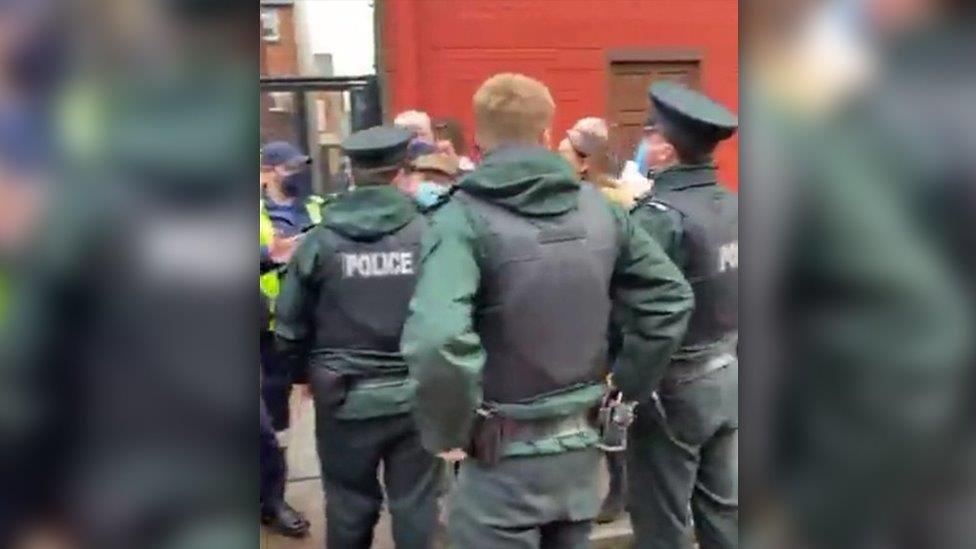PSNI 'crisis in confidence' among nationalists, says Michelle O'Neill
- Published
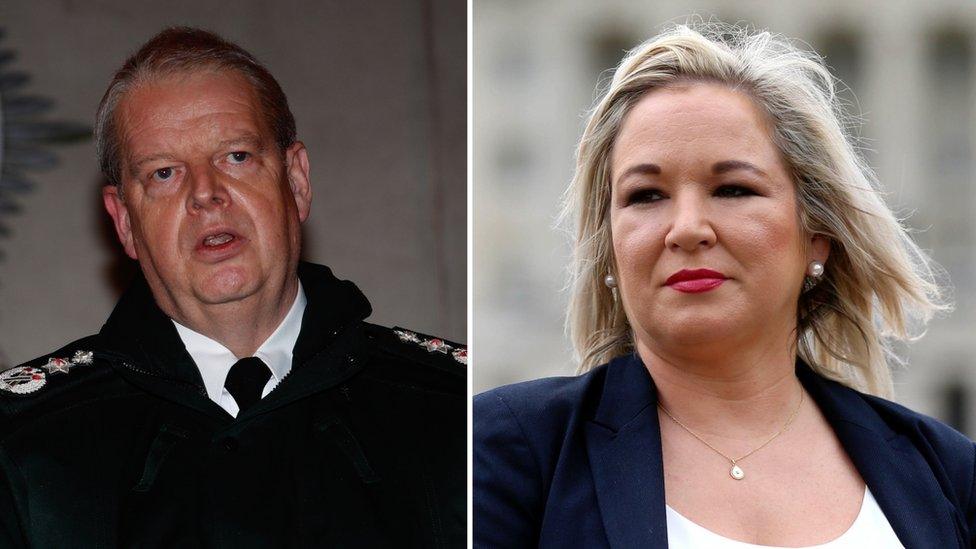
PSNI Chief Constable Simon Byrne has said he accepts he is under increased scrutiny but Michelle O'Neill said she was not calling for him to resign
NI's deputy first minister has said there is a "crisis in confidence" in policing among nationalists over the PSNI's handling of a commemoration event on Friday.
However, Michelle O'Neill said she was not calling for NI's police chief to resign.
An officer has been suspended and another redeployed, with Simon Byrne issuing an apology after a man was arrested at the event.
Mr Byrne has said he will not quit.
Speaking to the BBC's Sunday Politics programme Ms O'Neill said she would lead a delegation on Monday morning to put questions to the PSNI's chief constable.
She said she wished to "engage with him directly" on who will be held accountable for what happened.
The arrest happened after people had gathered on the Ormeau Road in Belfast to mark the anniversary of a gun attack, in which five people were murdered by loyalists.
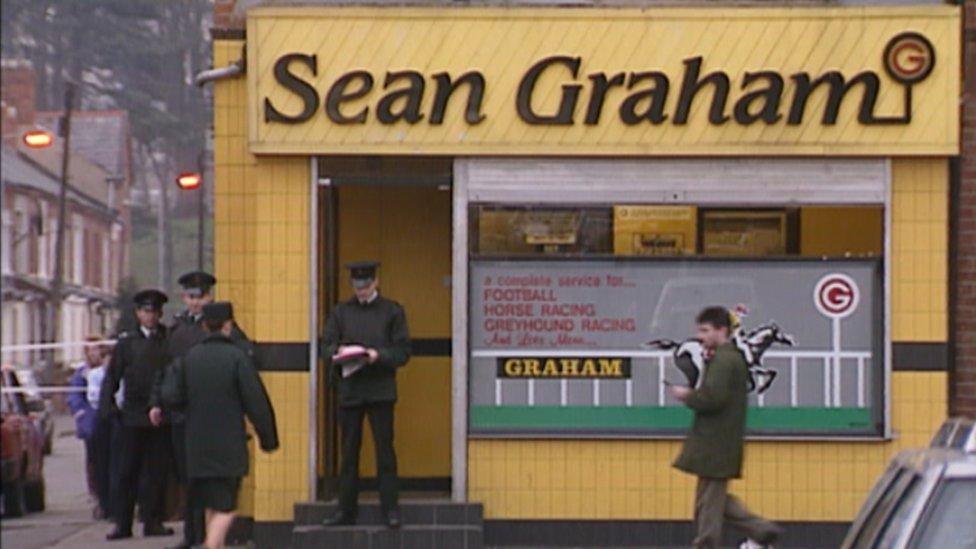
People gathered at the scene of the 1992 gun attack to remember the victims
Relatives of the victims had gathered at the site to lay flowers and mark the 29th anniversary of the murders.
The man who was arrested, Mark Sykes, had been shot and injured in the attack on a Sean Graham bookmakers shop in February 1992.
Video footage posted on social media shows a confrontation between police and people attending the event, after which Mr Sykes was arrested.
Footage of the incident has been posted online
He was released a few hours later.
Large public gatherings are banned under current coronavirus restrictions and police said that "30 to 40 people" had attended the memorial.
Ms O'Neill described the actions of officers as "crass" and "vulgar".
She compared the police's actions on Friday to images, circulated on social media, of masked men in east Belfast, saying they were "allowed to walk uninterrupted".
"I think that the direct contrast in policing is laid bare for all to see.
"I think anybody who considers all those things in the round would understand that there certainly is a crisis in confidence in policing among the nationalist community."
Traditional Unionist Voice (TUV) party leader Jim Allister told Sunday Politics that Sinn Féin was using the issue to "destabilise" Northern Ireland.
"Once more we hear all this talk that we used to hear 20 years ago about an unacceptable police force," he said.
"It's quite clear to me that it's playing into the agenda that is never far from the surface of destabilising Northern Ireland because, though they're in government in Northern Ireland, they don't want it to work."
'Trial by social media'
On Saturday night, PSNI Chief Constable Simon Byrne made a public apology for the actions of his officers.
Speaking at a news conference outside police headquarters on Saturday evening, Mr Byrne acknowledged that his leadership of the PSNI is under increased scrutiny.
"Clearly that's the question on everybody's lips, but I'm not a quitter," he said.
"I took this job with my eyes open, determined to invest my time, my capital working with a top team, to deliver on my promise which was visible, accessible and responsive community policing.
"If I quit now it would just leave the same set of problems for whoever stood in my shoes. This is about leadership, it's about calm heads and direction."
Chief Constable apologises over memorial arrest
Sinn Féin leader Mary Lou McDonald had described the statement by Mr Byrne as a "token gesture" and said it would not undo "the damage done to public confidence in policing".
The Democratic Unionist Party (DUP) questioned why the Police Service of Northern Ireland (PSNI) took action against officers before the outcome of a Police Ombudsman inquiry.
The party said: "We cannot have trial by social media and we cannot have rushed announcements to suit some political agenda."

A man under pressure
Analysis by Mark Simpson, BBC News NI correspondent
One of the most striking comments by the chief constable was his acceptance that his leadership is being questioned.
Rather than pretend it is not an issue he said "clearly that's the question on everybody's lips".
His words, and actions, suggest he knows he is man under pressure.
He clearly felt the need to clear the air, and re-affirm his leadership, even if it meant standing in the freezing cold for 10 minutes on a Saturday night.

The head of the Police Federation, which represents officers in Northern Ireland, said the two officers disciplined were "being scapegoated" and that it was not acceptable.
Mark Lyndsay said the PSNI had been criticised in the past for taking "no action whenever there are potential breaches" of Covid-19 restrictions, such as at funerals.
"Here, all of a sudden, when we do actually go to speak to people we're absolutely crucified.
"So it seems at the minute, as far as police dealing with Covid is concerned, we're damned if we do and we're damned if we don't."
'Wait for Ombudsman's inquiry'
The chair of the Northern Ireland Policing Board Doug Garrett said the chief constable's apology was a "welcome first step".
Mr Garrett said there was an "urgent necessity to repair damage caused to community relations arising from the policing approach on Friday".
However, four DUP members of the Policing Board questioned that statement, saying it was "not an agreed position".
In a joint statement, NI Assembly members Joanne Bunting, Trevor Clarke, Tom Buchanan and Mervyn Storey said the "proper course of action would have been to await the outcome of the Ombudsman inquiry".
The Police Ombudsman's Office confirmed on Friday night that it has begun an investigation into the events and the PSNI said it is co-operating with that inquiry.
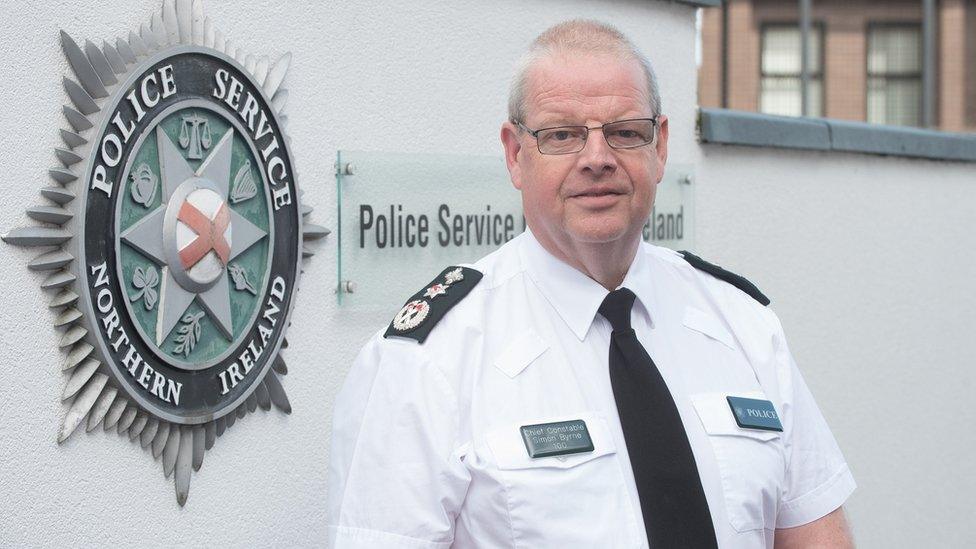
Simon Byrne has said he will not resign over the PSNI's handling of the Ormeau Road incident
Mr Byrne has been chief constable of the PSNI since July 2019.
His previous contract, as chief constable of Cheshire Police, ended in June 2018 while he was fighting a disciplinary case involving complaints of bullying staff.
He was exonerated and a review found the investigation was "flawed" and based on "flimsy" allegations.
Mr Byrne had the most experience of the four applicants for the £207,000-a-year PSNI job, having held high ranks in the Metropolitan, Merseyside and Manchester police forces.
Related topics
- Published6 February 2021
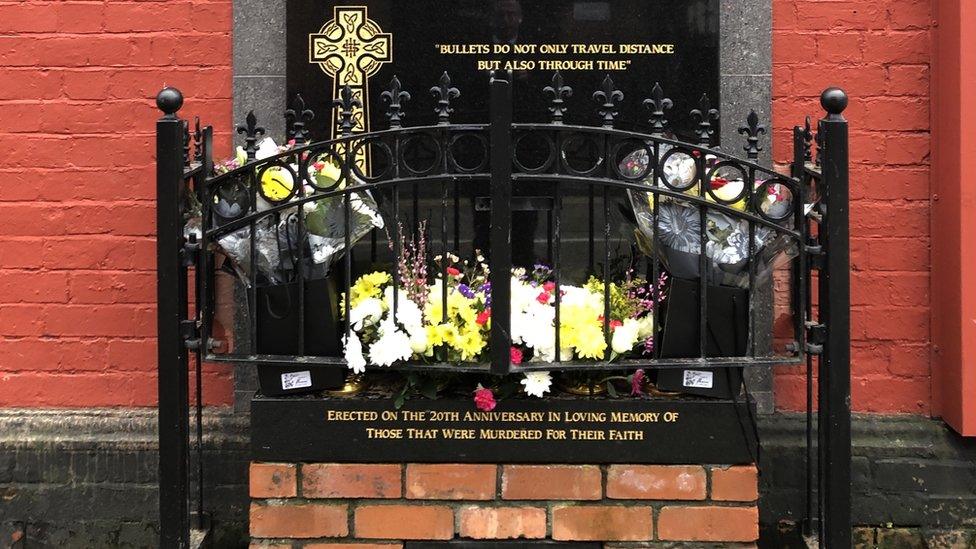
- Published5 February 2021
